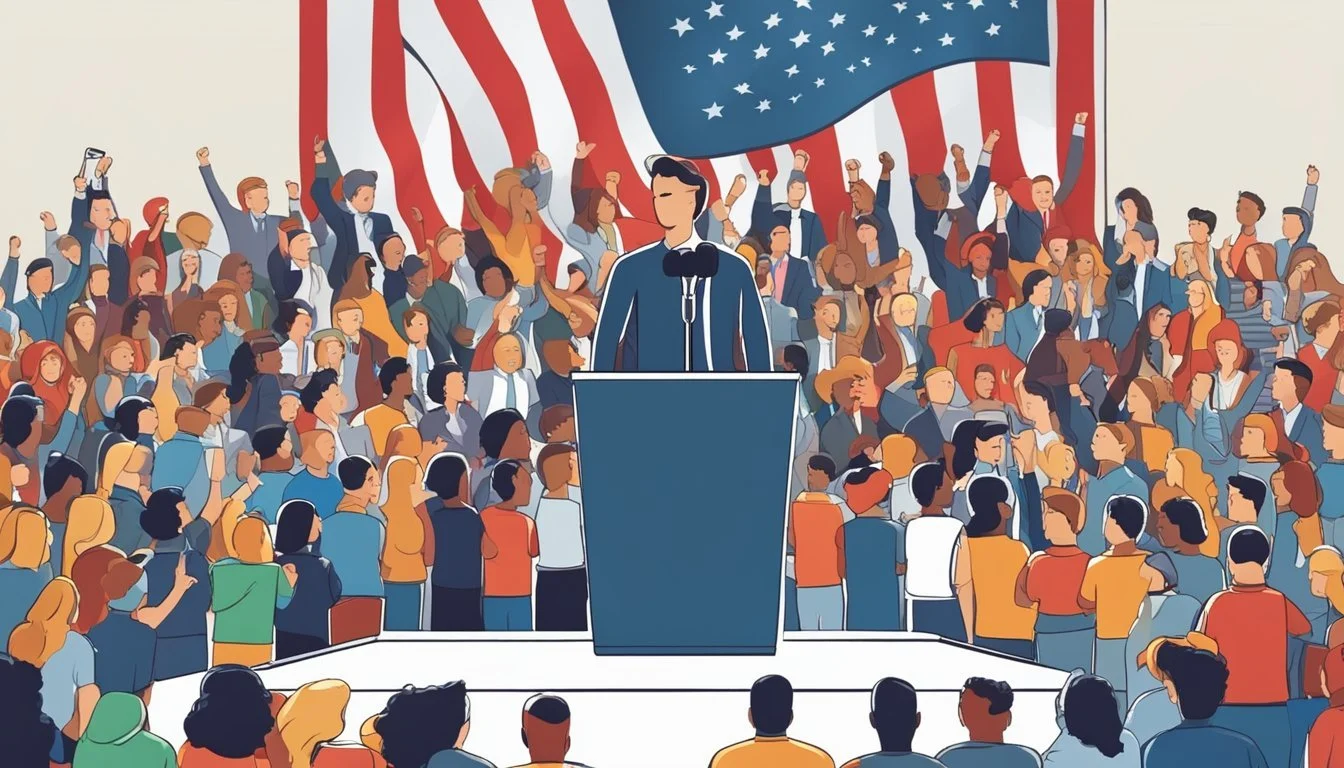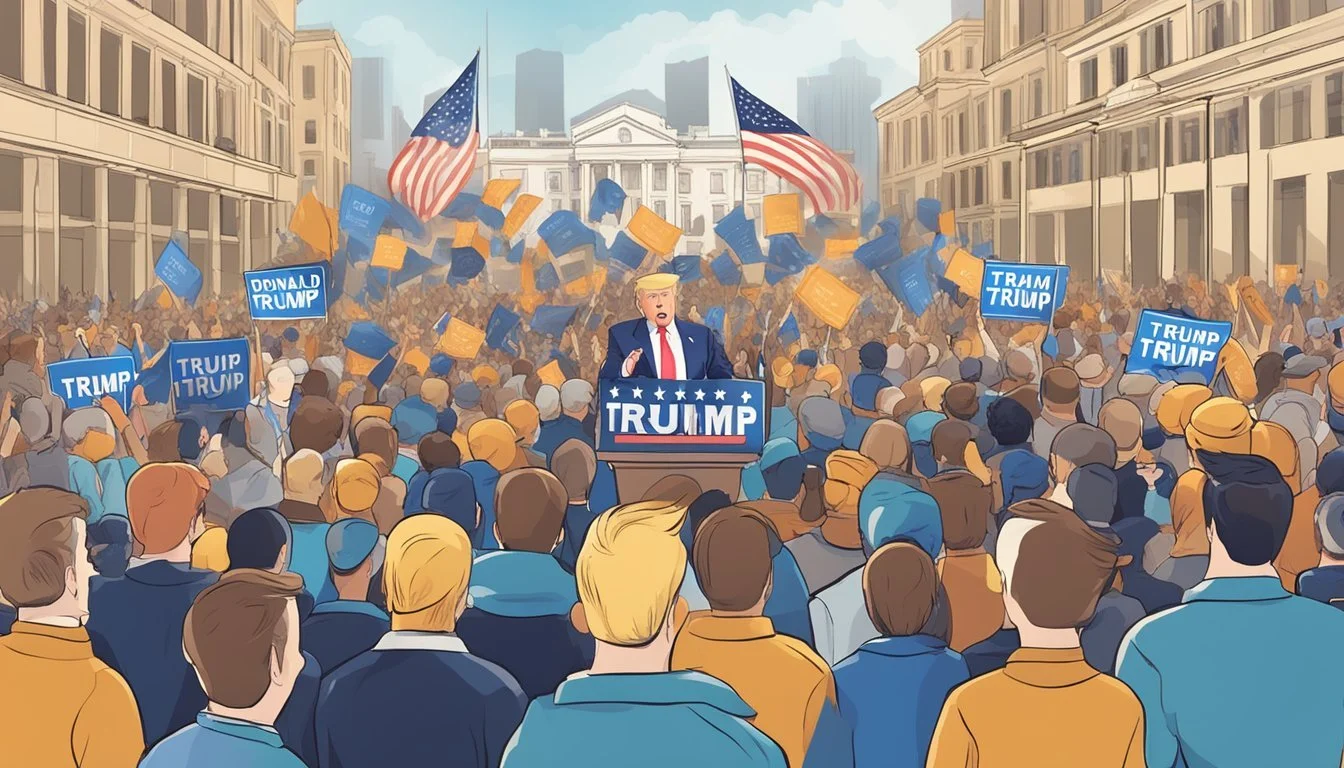The Early Life and Origins of President Trump
Key Facts About the 45th President's Early Life
Donald Trump entered the world on June 14, 1946, in Queens, New York City. Born Donald John Trump, he would go on to become the 45th President of the United States, serving from 2017 to 2021. His parents were Frederick Christ Trump Sr., a successful real estate developer, and Mary Anne MacLeod Trump, a Scottish immigrant.
Trump grew up in a wealthy family and attended the New York Military Academy for his high school education. He later pursued higher education at Fordham University before transferring to the University of Pennsylvania's Wharton School, where he earned a Bachelor of Science degree in economics in 1968.
After completing his education, Trump joined his father's real estate business. He quickly rose to prominence in the New York City real estate scene, taking over as president of the family company in 1971. This early business experience laid the foundation for his later career in both business and politics, culminating in his successful bid for the presidency in 2016.
Early Life and Education
Donald Trump's formative years were shaped by his upbringing in New York and his educational experiences at military school and university. These early influences laid the foundation for his future business and political career.
Birth and Family Background
Donald John Trump was born on June 14, 1946, in Queens, New York. He was the fourth of five children born to Frederick Christ Trump Sr. and Mary Anne MacLeod Trump.
His father was a successful real estate developer, while his mother was a Scottish immigrant who worked as a homemaker. Trump grew up in a wealthy family in the Jamaica Estates neighborhood of Queens.
Education Journey
Trump's education began in Queens before he was sent to the New York Military Academy at age 13. He spent five years at the private boarding school, graduating in 1964.
After high school, Trump attended Fordham University in the Bronx for two years. He then transferred to the Wharton School of Finance at the University of Pennsylvania.
In 1968, Trump graduated from Wharton with a Bachelor of Science degree in economics. His time at these institutions exposed him to business concepts and networking opportunities that would later prove valuable in his career.
Business Career
Donald Trump's business career spans decades and encompasses real estate, entertainment, and branding ventures. He built a vast empire through high-profile projects and aggressive deal-making, though not without controversy and setbacks.
Real Estate Ventures
Trump joined his father's real estate company in 1971, renaming it The Trump Organization. He focused on Manhattan, acquiring and renovating properties like the Commodore Hotel, which became the Grand Hyatt. In 1983, Trump Tower opened on Fifth Avenue, becoming his signature property and headquarters.
He expanded to Atlantic City in the 1980s, developing casinos including Trump Plaza and Trump Taj Mahal. These ventures initially brought success but later faced financial troubles.
Trump's real estate portfolio grew to include golf courses and luxury resorts worldwide. Notable properties include Mar-a-Lago in Florida and Trump International Hotel in Washington, D.C.
Expansion into Entertainment
In 2004, Trump entered television with "The Apprentice". The reality show became a hit, running for 14 seasons and spawning "The Celebrity Apprentice". It significantly boosted Trump's public profile and personal brand.
He licensed his name to various products, from steaks to vodka. These licensing deals became a major revenue stream, allowing him to profit from his celebrity status without significant investment.
Trump also owned the Miss Universe pageant from 1996 to 2015, further cementing his place in entertainment media.
Financial Challenges
Despite his successes, Trump's businesses faced several financial difficulties. In the early 1990s, his Atlantic City casinos struggled with debt, leading to corporate bankruptcies.
The Trump Taj Mahal filed for bankruptcy in 1991, followed by Trump Plaza and Trump Castle in 1992. Trump Hotels and Casino Resorts filed for bankruptcy in 2004, and Trump Entertainment Resorts in 2009.
These setbacks led to restructuring and loss of ownership stakes in various properties. However, Trump often emphasized that he personally never declared bankruptcy.
Trump Organization
The Trump Organization serves as the primary vehicle for Trump's business interests. It manages properties, golf courses, and hotels globally.
The company faced scrutiny during Trump's presidency due to potential conflicts of interest. In response, Trump handed control to his sons, Donald Jr. and Eric.
Post-presidency, the organization has been subject to legal investigations regarding its financial practices. Despite challenges, it continues to operate various properties and licensing agreements worldwide.
Public Profile
Donald Trump cultivated a high-profile public persona through media appearances, branding efforts, and involvement in beauty pageants. His published works and catchphrases further solidified his image as a business mogul and celebrity figure.
Media and Branding
Trump leveraged media exposure to build his personal brand. He hosted "The Apprentice" reality TV show from 2004 to 2015, popularizing his catchphrase "You're fired!" The program boosted his fame and reinforced his image as a savvy businessman.
Trump licensed his name to various products and properties, including hotels, golf courses, and consumer goods. This branding strategy expanded his reach and reinforced his reputation for luxury and success.
His slogan "Make America Great Again" became a powerful marketing tool during his 2016 presidential campaign. The phrase appeared on red baseball caps and other merchandise, becoming synonymous with Trump's political brand.
Published Works
Trump co-authored several books, most notably "The Art of the Deal" in 1987. This bestseller presented Trump's business philosophy and helped establish his public image as a dealmaker.
Other titles include "Trump: The Art of the Comeback" (1997) and "Trump: How to Get Rich" (2004). These books further promoted Trump's personal brand and business acumen.
Trump's books often topped bestseller lists, reinforcing his status as a successful entrepreneur and public figure. They typically focused on business advice, real estate strategies, and Trump's personal experiences.
Beauty Pageants and Social Events
Trump owned the Miss Universe Organization from 1996 to 2015. This included the Miss USA and Miss Teen USA pageants, giving him a platform in the entertainment industry.
He frequently attended high-profile social events in New York City and Palm Beach. These appearances kept him in the public eye and reinforced his image as a wealthy socialite.
Trump's involvement in beauty pageants sometimes sparked controversy. His comments about contestants and pageant rules occasionally drew criticism and media attention.
Political Career
Donald Trump's political career was marked by controversy, unconventional strategies, and significant policy shifts. His rise to the presidency and subsequent term reshaped American politics.
2016 Presidential Campaign
Trump announced his candidacy for president in June 2015, running as a Republican. He defeated 16 other candidates in the primary, securing the nomination. Trump's campaign focused on immigration, trade, and "draining the swamp" of Washington insiders.
He faced Democratic nominee Hillary Clinton in the general election. Despite losing the popular vote by nearly 3 million votes, Trump won the Electoral College 304 to 227. His victory was fueled by narrow wins in key swing states like Michigan, Wisconsin, and Pennsylvania.
Trump's use of social media, particularly Twitter, was unprecedented for a presidential candidate. He held large rallies and dominated media coverage throughout the campaign.
Key Political Actions and Policies
As president, Trump implemented several major policy initiatives. He appointed three Supreme Court justices, shifting the court's ideological balance. Trump signed significant tax cuts and criminal justice reform legislation.
His administration focused on immigration enforcement, including attempts to build a wall on the U.S.-Mexico border. Trump withdrew from international agreements like the Paris Climate Accord and Iran nuclear deal.
He renegotiated trade deals, including NAFTA, and engaged in a trade war with China. Trump's response to the COVID-19 pandemic became a central issue of his presidency.
Impeachment Proceedings
Trump was impeached twice by the House of Representatives, a first in U.S. history. In December 2019, he was impeached for abuse of power and obstruction of Congress related to his dealings with Ukraine.
The Senate acquitted Trump in February 2020. He was impeached again in January 2021 for incitement of insurrection following the January 6 attack on the U.S. Capitol.
The Senate trial occurred after Trump left office, resulting in acquittal. These proceedings intensified political divisions and debates about presidential power.
2020 Presidential Election
Trump ran for reelection in 2020, facing Democratic nominee Joe Biden. The campaign was shaped by the COVID-19 pandemic, economic concerns, and racial justice protests.
Biden won both the popular vote and the Electoral College. Trump disputed the results, claiming widespread voter fraud without evidence. His legal challenges were unsuccessful in overturning the election outcome.
Trump's refusal to concede and his rhetoric leading up to January 6, 2021, sparked controversy and led to his second impeachment. The transition of power was tumultuous, marking a contentious end to Trump's term in office.
Personal Life
Donald Trump's personal life has been marked by multiple marriages, a large family, and various interests outside of business and politics. He has been married three times and has five children.
Marriages and Family
Trump's first marriage was to Ivana Zelníčková in 1977. They had three children together: Donald Jr., Ivanka, and Eric. The couple divorced in 1992.
In 1993, Trump married actress Marla Maples. They had one daughter, Tiffany, before divorcing in 1999.
Trump's current wife is Melania Knauss, whom he married in 2005. They have one son, Barron, born in 2006.
His adult children have been involved in his business ventures and political campaigns. Donald Jr. and Eric have managed the Trump Organization, while Ivanka has served as an advisor during his presidency.
Health and Personal Interests
Trump is known for his interest in golf. He owns numerous golf courses worldwide and has frequently played the sport throughout his life.
Mar-a-Lago, his Florida estate, serves as both a private club and a personal retreat. He has spent significant time there, especially during his presidency and post-presidency years.
Trump's health has been a topic of public interest. He has claimed to be in excellent health, though specifics about his medical conditions are limited.
His diet reportedly includes fast food and diet sodas. Trump is known to be a teetotaler, abstaining from alcohol and tobacco.
Controversies and Legal Issues
Donald Trump has faced numerous legal challenges throughout his business career and presidency. His involvement in litigation spans decades and encompasses a wide range of issues.
Business Litigation
Trump and his businesses have been involved in over 4,000 legal cases in U.S. federal and state courts since 1973. These include disputes with casino patrons, real estate lawsuits worth millions, and over 100 business tax disagreements.
Trump's companies have filed for bankruptcy multiple times. His Atlantic City casinos declared bankruptcy in 1991, 1992, 2004, and 2009.
In 2016, Trump settled a lawsuit against Trump University for $25 million. The suit alleged that the real estate seminar program defrauded students.
Political Disputes
As president, Trump faced two impeachment trials. The first in 2019 concerned his dealings with Ukraine. The second in 2021 related to the January 6 Capitol attack.
Trump's attempts to overturn the 2020 election results led to legal challenges in multiple states. Courts dismissed over 60 lawsuits filed by Trump and his allies.
In 2022, the House January 6 committee referred Trump to the Justice Department for potential criminal charges related to the Capitol riot.
Personal Allegations
Trump has faced accusations of sexual misconduct from multiple women. He denies all allegations.
In 2018, Trump's former lawyer Michael Cohen pleaded guilty to campaign finance violations. These related to hush money payments made to adult film actress Stormy Daniels.
In 2023, Trump was indicted on 34 felony counts in New York. The charges involve allegedly falsifying business records related to the Stormy Daniels payment.
Trump faces additional criminal charges in Georgia and federal cases involving classified documents and efforts to overturn the 2020 election.
Post-Presidency
After leaving office in January 2021, Donald Trump remained a prominent figure in American politics and business. He faced legal challenges while maintaining his influence within the Republican Party.
Ongoing Business Interests
Trump returned to managing his business empire after his presidency. The Trump Organization continued to operate hotels, golf resorts, and real estate properties worldwide. His name remained on numerous buildings and developments. Trump's net worth fluctuated, with Forbes estimating it at $2.5 billion in 2022.
The company faced increased scrutiny from regulators and prosecutors. Some properties saw declining revenues post-presidency. Trump's sons, Donald Jr. and Eric, took on larger roles in day-to-day operations.
Political Influence
Trump retained significant sway over the Republican Party after leaving office. He endorsed candidates in primary elections and remained a popular figure at conservative events. His "Make America Great Again" movement continued to shape GOP politics.
In November 2022, Trump announced his candidacy for the 2024 presidential election. He secured the Republican nomination in early 2024. His campaign focused on issues like immigration, trade, and criticizing the Biden administration.
Trump's use of social media remained a key part of his political strategy. After being banned from Twitter in 2021, he launched his own platform, Truth Social.
Legal Developments
Trump faced numerous legal challenges post-presidency. In May 2024, a New York jury convicted him on 34 felony counts related to falsifying business records. This marked the first time a former U.S. president was convicted of a crime.
Other ongoing investigations included:
Efforts to overturn the 2020 election results in Georgia
The January 6, 2021 Capitol riot
Handling of classified documents after leaving office
Trump consistently denied wrongdoing and claimed the investigations were politically motivated. These legal battles impacted his business operations and political activities.
Impact and Legacy
Donald Trump's presidency left a significant mark on American politics and society. His tenure saw major shifts in domestic and foreign policy, as well as profound cultural impacts that continue to reverberate.
Domestic Policy
Trump's domestic agenda focused on populist and protectionist measures. He implemented sweeping tax reforms, cutting corporate rates and individual taxes. The administration imposed tariffs on imported goods, particularly from China, aiming to boost domestic manufacturing.
Immigration was a central issue. Trump pushed for construction of a border wall with Mexico and implemented stricter policies on illegal immigration. This led to a government shutdown in 2018-2019 over wall funding disagreements.
The COVID-19 pandemic defined Trump's final year in office. His response faced criticism for downplaying the virus's severity and clashing with public health experts. Operation Warp Speed accelerated vaccine development, though distribution challenges emerged.
Foreign Affairs
Trump's "America First" approach reshaped U.S. foreign relations. He engaged in direct talks with North Korea's Kim Jong Un, marking a shift from previous administrations. While tensions initially eased, negotiations ultimately stalled.
The administration moved the U.S. Embassy in Israel to Jerusalem, recognizing it as the capital. This decision pleased Israeli allies but angered Palestinians and many Arab nations.
Trump withdrew from international agreements like the Paris Climate Accord and Iran nuclear deal. He renegotiated trade deals, including NAFTA, seeking more favorable terms for the U.S.
Cultural and Social Influence
Trump's combative communication style and use of social media transformed political discourse. His tweets often drove news cycles and sparked controversy.
His presidency deepened political polarization in the U.S. Trump's base remained fiercely loyal, while opponents were equally passionate in their opposition.
The administration's policies on issues like climate change, LGBTQ+ rights, and racial justice sparked widespread protests and social movements. Trump's claims of election fraud in 2020 led to the January 6 Capitol riot, a stark moment in American democracy.








